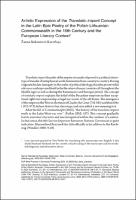Chapter Artistic Expression of the Translatio imperii Concept in the Latin Epic Poetry of the Polish-Lithuanian Commonwealth in the 16th Century and the European Literary Context
| dc.contributor.author | Nekrashevich-Karotkaja, Zhanna | |
| dc.date.accessioned | 2022-06-01T12:14:33Z | |
| dc.date.available | 2022-06-01T12:14:33Z | |
| dc.date.issued | 2020 | |
| dc.identifier | ONIX_20220601_9788855181983_312 | |
| dc.identifier.issn | 2612-7679 | |
| dc.identifier.uri | https://library.oapen.org/handle/20.500.12657/56129 | |
| dc.description.abstract | In this article the author analyzes how the Renaissance epic poetry of the Polish-Lithuanian Commonwealth approaches the theme of translatio imperii, which is a concept and a political stereotype of transfer of metaphysical world domination from country to country. After the fall of Constantinople (1453), the concept of translatio imperii gradually lost its universal character and was interpreted within the confines of a nation. Among the analyzed poems are: Bellum Prutenum (1516) by Ioannes Visliciensis and Radivilias (1592) by Ioannes Radvanus. The artistic expression of both the “Jagiellonian” and Lithuanian (i.e., Grand Duchy of Lithuania) patriotism, which incorporated the concept of translatio imperii, had an enormous impact on the formation of the national identity of the Belarusian, Lithuanian, and Polish peoples. | |
| dc.language | English | |
| dc.relation.ispartofseries | Biblioteca di Studi Slavistici | |
| dc.subject.other | Translatio imperii | |
| dc.subject.other | Latin epic poetry | |
| dc.subject.other | Renaissance | |
| dc.subject.other | Polish-Lithuanian Commonwealth | |
| dc.subject.other | literary production | |
| dc.subject.other | aesthetic experience | |
| dc.title | Chapter Artistic Expression of the Translatio imperii Concept in the Latin Epic Poetry of the Polish-Lithuanian Commonwealth in the 16th Century and the European Literary Context | |
| dc.type | chapter | |
| oapen.identifier.doi | 10.36253/978-88-5518-198-3.05 | |
| oapen.relation.isPublishedBy | bf65d21a-78e5-4ba2-983a-dbfa90962870 | |
| oapen.relation.isbn | 9788855181983 | |
| oapen.series.number | 45 | |
| oapen.pages | 22 | |
| oapen.place.publication | Florence |

